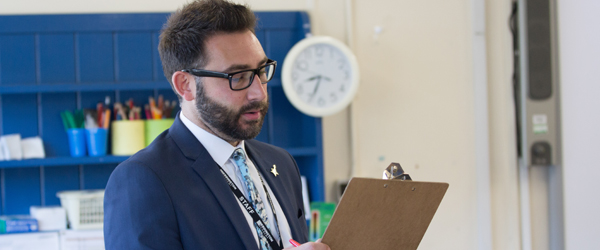Academy Life
Teaching and Learning
Our aim is to develop both staff and students to ensure all students excel in lessons and achieve the highest outcomes.
The breadth of the curriculum at Smith’s Wood Academy and the needs of our students mean that the implementation of the curriculum in each subject is not identical but feature a number of common aspects.
As a school we have adopted the Teaching for Excellence Model to the curriculum and to curriculum delivery. The curriculum for every department is knowledge rich and emphasises the development and securing of deep knowledge. Teachers plan learning around carefully designed Learning Journeys. Our curriculum is designed to provide a flexible, personalised education – knowing that one size does not fit all and preparing students for their future lives. This allows our children to succeed in modern society.
Teachers at Smith’s Wood are asked to adopt the Teaching for Excellence model of teaching which is based on 6 key principles;
- High quality explanation
- Deliberate practice
- Modelling
- Questioning
- High quality feedback (live and deep feedback)
- High expectations
Teachers also ensure regular reading and the use of targeted vocabulary is prioritised to allow students to access the full curriculum offer.
Smith’s Wood Academy aims to support every member of staff in becoming an outstanding teacher. A varied professional development programme is provided that caters for teachers at all stages in their career; teachers are encouraged to share their ideas and learn from each other. Our Coaching Programme has been well received by staff and is highly effective in terms of developing teaching and learning. This is supplemented with a Professional Learning programme offered by the Trust.

Teaching and Learning
Knowledge is power. Information is liberating.
Kofi Annan
At Smith’s Wood Academy, we believe all students, whatever their background, are able to become experts in the disciplines that they study. Their expertise will be achieved through
quality teaching and the dissemination of deep knowledge by highly skilled and knowledgeable subject experts. The Teaching
for Excellence Model will prevail – in every classroom, every lesson, every day.
Our students have the right to be introduced to deep knowledge and
a wealth of information from the spectrum of subjects that they study. They will be introduced to, and understand, theories and principles
that have influenced, continue to influence, and will influence in the future, the world in which they live. They will be prepared to fully engage in academic discussion about their learning.
This learning will secure a successful place in society for our students. They will go further than they ever thought possible.
To support teachers in delivering this vision the Academy;
- - Does not require teachers to mark classwork; they focus instead on live in-lesson feedback and on providing students with individual and whole class deep feedback.
- - Provides training and support in delivering lessons using the Teaching for Excellence Model for teaching and learning
An overview of the curriculum coverage for each subject area can be found on the curriculum link above, in “Our Academy” tab.
Teaching for Excellence
At Smith’s Wood Academy we have transformed the way in which we plan lessons and give feedback to students. Our starting point for the recent revolution has been a bedrock of scientific research into the science of learning. For example, “http://www.danielwillingham.com/”Daniel Willingham’s assertion about the importance of knowledge:
“Data from the last thirty years lead to a conclusion that is not scientifically challengeable: thinking well requires knowing facts, and that’s true not simply because you need something to think about. The very processes that teachers care about most — critical thinking processes such as reasoning and problem solving — are intimately intertwined with factual knowledge that is in long-term memory (not just found in the environment).”
There are two parts of Willingham’s assertion:
1) You can only think deeply and critically about what you know well and what you have a lot of knowledge about.
2) To aid thinking, that knowledge must be encoded in long-term memory. Retrieval practice is the tool that encodes knowledge in long term memory.
Further research in the cognitive sciences makes clear that the battle against forgetting begins as soon as you learn something and that the best time to practice retrieving something from long-term memory is when you have started to forget it. When you have to work harder to remember something, but then do so, you build a stronger neural pathway of the thing you are trying to remember (or not forget).
Therefore, in May 2017 we began the first tentative steps of our journey toward a knowledge based curriculum, and the Teaching for Excellence Model. Fast forward to September 2022 and we are well underway with the transformation and evolution – we have re-set our expectations around T&L, with a clear focus on what we our expectations are. This approach ensures that lessons follow a very simple framework.
The lesson structure can best be described as follows:
- DNA (Do Now Activity) – retrieval practice is the purpose of DNAs (to stem the forgetting).
- Explanation (modelling is key here) – the teacher (the expert) tells the students the key information they need to know/understand.
- Making sense (through questioning and further modelling/support) the students get their heads around the concept – and prove to the teacher that with support, they can grasp the knowledge.
- Deliberate practice – here students deliberately practice the knowledge, applying it towards a scenario/proving they really understand the concept.
- Feedback – the teacher is able to address misconceptions and check for clear understanding, while putting the onus on the students to correct their errors and improve their work.
To support our delivery of this work we’ve put in place (and are continuing to do so) some very highly focused training on each of these aspects.

Feedback
Our approach to Feedback has also been transformed. At Smith’s Wood Academy we recognise that effective feedback is one of the most powerful tools in enhancing student achievement (Hattie in Ainsworth & Viegut 2006). As a result, all students have an entitlement to receive regular feedback.
We understand the importance of teacher workload in relation to feedback, therefore the policy outlined below is underpinned by the following key principles of best practice as outlined by the Education Endowment Foundation (EEF).
- Feedback should redirect or refocus either the teacher’s or the learner’s actions to achieve a goal.
- Feedback should identify strengths within student’s work.
- Feedback must give a short term target for improvement (be able to be completed within a lesson).
- Attainment grades will only be given where relevant (end of unit assessments).

Feedback at Smith’s Wood Academy therefore takes two forms. Live feedback and deep feedback. Teachers no longer mark a students’ book, instead the teacher spends time identifying errors made by students at point of error, addressing these immediately. Whilst teachers will also read through a students’ work, making notes in a teacher notebook – to share success and areas for development with the class as a whole. The improvement we have seen within students books as a result of these changes has been incredible.
Reading
Importance of Literacy
At Smith’s Wood Academy, we take literacy seriously and believe in equipping students with the essential literacy skills as they will need to access each subject they study and for life outside of school. Therefore, it is our belief that literacy should be an integral part of all teaching within the school. We advocate that every lesson should build upon, and nurture, the array of transferable skills literacy provides.
Literacy covers the three key aspects of reading, writing and speaking.. In all subjects across the curriculum, we strive to support students in their literacy development. These skills are not only essential for learning the full curriculum at Smith’s Wood Academy, but also vital for life outside of school. Students need literacy to engage with written words used in everyday life. Literacy skills allow students to explore information, explore subjects in depth, and as a result, gain a deeper understanding of the world around them. Smith’s Wood Academy staff receive regular training, and we have many whole school initiatives to promote and improve literacy.
School Based Literacy Strategy
At Smith’s Wood Academy we take literacy seriously and believe that reading, writing and speaking are the key to student’s progress across the curriculum.
Across the school we support students with their reading as a propriety and do this through:
- Quality First Teaching in all our lessons, which enables all students to access good teaching of literacy throughout all subject disciplines. Teachers use explicit instruction to explain key vocabulary.
- Everyone completes an NGRT reading test that gives students a reading age. This enables teachers to tailor lessons to support and stretch each reader.
- In English lessons they have one reading lesson where staff address key skills including grammar, punctuation and spelling
What can parents and carers do to help?
To benefit from reading it is recommended children read for between 15 and 30 minutes per day. This can be on any chosen topic, any form of text and most importantly something they enjoy.
To support communication of ideas and encourage your child to discuss their reading we suggest the ‘Talk with TRUST’ model from the Education Endowment Foundation below:
Take turns to make plans and predications before reading.
Recap to check ideas and understanding as your child is reading.
Use encouragement and praise to keep children engaged in reading.
Share prior knowledge and past experiences that link to what is being read.
Tune- in and listen to your child – be curious about their interests.

Reading at Smith’s Wood Academy
The development of reading is a key ambition at Smith’s Wood Academy; therefore we support all students to develop their reading skills across all subject areas. All teachers plan for reading and use a number of school wide strategies to ensure that reading progression is taking place in all classrooms. Whether in art, mathematics, history or science all teachers help to enhance students reading abilities alongside their academic progress.
Key strategies have been adopted across the school to ensure that reading is supported in all classrooms.
Several Smiths Wood Academy staff have received training to deliver the highly effective Switch On Reading Programme. This is our ten-week intervention programme to support students to develop their reading skills at a rapid pace. This targeted, small group support gives students a great boost in their reading skills, and develops the reading confidence required to be successful in the classroom.
We promote reading for pleasure through our Tutor Reading Programme which enhances the reading that takes place across the curriculum. Form Tutors read a short story through each academic half-term. Across the year students are exposed to over six stories that they might not have otherwise discovered and explored, building knowledge of a variety of contemporary authors and genres
We want all our students to develop excellent reading habits and to recognise the benefits of reading on their progress and their well-being; reading for pleasure is therefore rewarded and celebrated within our Academy.




